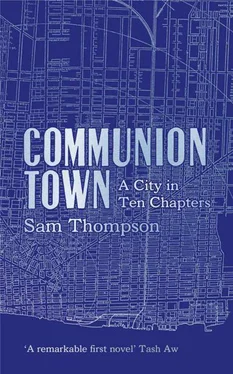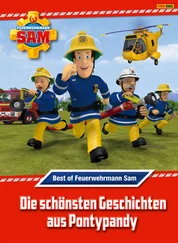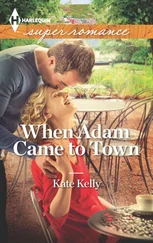Halfway down the corridor another door stands ajar. Rather than move it on the hinge he eases through the narrow gap. This room holds things from his grandmother’s past: insectile armchairs, a hard horsehair couch, a cherrywood rolltop desk owned by someone long gone. The windows look into slots of brick which are open at the top to let in the light.
The floor in here is covered with an elaborate model city, and he used to believe that the room was named accordingly: the City Room. He now knows that he misunderstood what his grandmother was saying, and that really the room is the Sitting Room. And yet, although he burns with shame to recall how often and how blithely he must have got it wrong — he imagines his own piping voice making the mistake over and over, and he can sense how it must have sounded to her, a lisping childish fault to be kindly overlooked — still he knows, deeper down, that this is the room’s true and secret name. The City Room.
It has grown far beyond its origins, this city. He built the first crude settlement with small wooden blocks, originally the playthings of an earlier generation of children, some of them plain and some painted primary colours, but all stained and faded. Most were just bricks, but there were doric columns, too, and cornices and broken pediments to crown town halls and triumphal arches. Once these were complete, he glimpsed further possibilities, and a dusty cardboard box full of thin metal plates and girders that bolt together with the help of a spanner provided the city with rail tracks and fortifications.
The game must have lasted weeks — certainly as long as he can remember — but his grandmother has not objected. She doesn’t understand the importance of the city, of course. He would try and explain if he could, but instinct tells him these things can’t be communicated. He knows with absolute clarity that the model city is far more remarkable than anyone else can understand. It must in fact be more important than anything else in the world, but he can never admit it, because when his grandmother or someone else looks into the room and sees his creation spread across the floor, it makes him squirm. Only when he is alone can his mind move through the streets and buildings he’s created, imagining the textures of their reality. This gives him a strange pleasure. He likes to perch on the floor, barely able to keep still, and hold it whole in his mind, letting the image deepen. What secrets. He floats in a warm capsule of possibility.
He has not grown; he is slight and tender, not like the boy from upstairs who has a greasy face and a forehead bristling with stiff fibres, and who would kick the city into rubble if he knew it was here.
He remembers a time in the upstairs boy’s room. The window looked into the shared back garden, where the frame for a swing drowned in weeds and a tract of rough brown grass ran down to a decrepit fence. The light out there was failing. The bonfire had been smouldering all day, its gymnasts of smoke somersaulting upward through the branches of the trees. In the room no one had turned the lights on. He could sense the upstairs boy’s father moving around downstairs somewhere, but he did not know where his grandmother was. He had to pretend not to be disgusted at the meaty smell of the room. Meaningless objects, strange furniture. The bed was not like his bed, and the toys were fakes intended to deceive him, manufactured evidence of a world that didn’t exist. There were comics as well but they were too strange to look at directly.
The upstairs boy, who had a large yellow spot in the back of his neck, collapsed on the floor, then got up again to kick over a chair, and came close, making gluey clicking noises. Nonchalantly, an arm grappled around his neck, fingers thrust themselves into his hair and a leg hooked behind his knees to try and bring him down to the floor. He had to fight off these attempts while pretending not to have noticed them. Time was strange in here. He knew that the scene was in some way permanent, pinched out of sequence: it is still going on, somewhere, in the inturned landscape of houses, waste grounds and streets where memory begins. In that loop of unevent he stands in the room with the upstairs boy prowling and grabbing, and a presence moving around downstairs, and the muddy, darkening garden lying under the window.
The city has spread and mutated, using whatever materials it could find. Roads from strips of cardboard, expanded polystyrene packaging for brutalist architecture. Once, abandoned beside some bins, he found three beautiful bricks of weathered yellow clay. They looked soft enough to crumble, but they chimed when they touched. They were rough and solid in the hands and two together were almost too heavy to lift. His grandmother helped him carry them home and in the City Room they became great landmarks. The city moulded itself to the terrain. One quarter flourished beneath an armchair, always in shadow, while elsewhere bridges and stairways gave access to the massif of the couch, and outposts spread along the ridge of its arms and back. He divided the city into districts and gave each one a name.
Under a windowsill, his grandmother’s plants trail down towards the floor in a strange perpendicular jungle. On the sill sits a heavy wooden box which she gave him. It has a sliding lid like an old-fashioned pencil case, and it contains a regiment of lead soliders in chipped red coats, the grey showing through, jumbled in their mass grave. Perhaps she meant him to use them for the garrison of his city. Who knows what dead darling they first belonged to? When she gave the soldiers to him, he emptied them out on the floor — they were identical men with pigeon chests and white faces — and began to set them on their feet, but he could not pretend to care much. What he wanted at that time was a Captain Maximum figure.
For his birthday she took him to the toy shop on Bittergreen Street and they had a whole rack. There must have been twenty. When he saw that, he was bereft, because he knew he could only have one. Captain Maximum led the goodies. The baddies were led by Caesar Skull. He wanted a goody but he did not know which were which: they looked at one and his grandmother said it must be a goody because a baddy would not have such a sad expression on his face. He agreed. One figure was a girl, the only girl allowed in Captain Maximum’s team. He did not look at her in case his grandmother noticed. He got the man with the sad expression, and carried him home hidden in a crackling white polythene bag, concealing his excitement.
But at home, when he freed the green man from his transparent plastic blister and studied the back of the packaging card, he realised he was a baddy after all. It was a ridiculous mistake to have made. This was a minion, a fish-man who lived underwater and could not do anything good. Any other Captain Maximum figure would have been better. He felt an awful pity for the fish-man, then wrenched both his arms from their sockets. Overcome with remorse and terror, he hid the figure in the bottom of his toy box. If only he had got the leader of the goodies. But he knew he could never ask for another.
He has made a map of the city and its surroundings by taping four sheets of paper together, and whenever he thinks of something new he squeezes it in, making tight marks with a pencil-point. He keeps the map safe in the narrow space between the wall and the bookcase. Not long ago, his grandmother came into the room as he was working, and he crumpled the paper in his haste to hide it.
He touches the edge of the map for reassurance but does not draw it out. He looks again at the thing he has stolen. It sits so lightly in his hand that he can hardly feel it, but he has the curious sense that in truth it is much heavier. He has a few hiding places but none of them is good enough for this.
Читать дальше
Конец ознакомительного отрывка
Купить книгу












